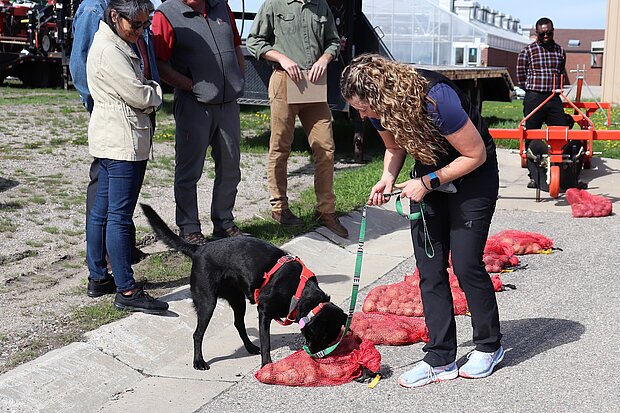All NDSU News
Potato disease is ‘going to the dogs’

Dogs are known for their keen sense of smell and are regularly used to detect explosives, illegal drugs and illness. It turns out they also can be trained to sniff out plant diseases.
In May, NDSU potato breeder Asunta “Susie” Thompson hired Andrea Parish, owner of Nose Knows Scouting, and her Labrador Zora, to evaluate the potato breeding project’s certified seed potato tubers for Potato Virus Y, known as PVY.
PVY causes yield loss and tuber defects and is a significant problem for certified seed potato growers.
Parish started her business about three years ago in Wyoming. “Dogs are used to detect bombs, drugs and other substances in mail sorting centers and airports, and I thought they would be useful on farms, too,” she said.
She asked her potato crop consultant husband if farmers are using dogs to detect diseases in potatoes. She was surprised to learn they were not.
“Although governments have spent millions of dollars trying, you can’t replace a dog’s nose,” Parish said. “It’s still the most accurate means of scent detection.”
Parish learned more about potato diseases from Neil Gudmestad, retired NDSU University Distinguished Professor of plant pathology and Endowed Chair of Potato Pathology, and by attending potato grower conferences. She learned to train dogs from top U.S. law enforcement officials, including FBI and drug detection dog trainers.
She has five dogs trained to detect potato diseases. She started with PVY, and more recently began training dogs to detect Bacterial Ring Rot.
Zora is a five-year-old black Labrador retriever that can detect PVY in tuber samples and young plants in the field.
Parish said Labradors and spaniels are a good fit for this type of work because they are high-energy, high-drive dogs that thrive on mental stimulation. “They like the brain work,” she said. “It’s like a big puzzle for them to figure out.”
Parish and Zora evaluated the NDSU potato breeding program’s entire collection of germplasm, which includes 1,000 different genotypes, in less than a day. When Zora detected PVY, she stood alert with her nose on the suspicious bag until Parish gave her the signal to release. The bags that Zora flagged were pulled aside to recheck later.
After all the bags were checked, individual tubers from the flagged bags were separated out and Zora identified the specific tubers that were positive for PVY, and the storage room was rechecked. After the entire process, only certified seed potato tubers free from PVY remained to plant the next generation of the breeding line.
Thompson says if the detection dog method is as accurate as laboratory testing for PVY, it could save the breeding project a significant amount of labor, time and resources. “What we tested this morning with the dog would have taken us three months in the lab,” she said.
Laboratory testing for PVY is a time-consuming and labor-intensive process because of the high volume of tests that must be prepared by the potato breeding staff and processed by the lab. In addition, valuable greenhouse space would be better used to screen new seed varieties than to detect and eliminate PVY in existing plant materials. Disease identification by detection dogs would help shorten the breeding process, allowing new potato varieties to be developed more quickly and benefiting potato producers sooner.
Thompson is looking forward to learning if the tubers that Zora identified as positive for PVY are confirmed in the laboratory. If the dog’s results are accurate, Thompson said that in the future, “I would hire [Nose Knows Scouting to scout for PVY] because of the economics and time savings.”
She envisions Parish visiting the program in the winter or early spring, to evaluate the seed material before planting, and again during the summer, to scout field research plots.
As a student-focused, land-grant, research institution, we serve our citizens.